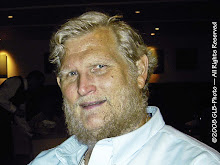 Last week, I introduced you to the Commentary in 'LensWork' by Brooks Jensen. In that commentary, he discussed creative blocks that photographers encounter in their work. Much of that related to the tendency to procrastinate and ten ways to break free of this block. Today, I want to go over the first five of these techniques in a little more detail.
Last week, I introduced you to the Commentary in 'LensWork' by Brooks Jensen. In that commentary, he discussed creative blocks that photographers encounter in their work. Much of that related to the tendency to procrastinate and ten ways to break free of this block. Today, I want to go over the first five of these techniques in a little more detail.I am both summarizing what Jensen presents as well as some of my own experiences with these techniques...
- Structure... Create a project! This project can help you structure a set of tasks that must be accomplished to complete the task. This definition provides the structure that leads to a goal. By starting to complete these tasks will, in turn, lead to the accomplishment of the overall goal. As many writing manuels discuss, it may not be important to complete them in sequential order. Of course, many tasks, such as the processing of a photograph from the camera work to the development process (film) to the print. By working towards the goal in small steps leads to MOTIVATION...
- Commitment... The planning process described in the previous point is only the start. To accomplish the goal, you must commit yourself, your energy, your resources and your time to that goal. This does not necessarily mean that you drop everything else, but that you budget some of your time and effort each day to the goal. Nothing gets done without such commitment. To facilitate this process, you might think about noting your daily progress in a diary, much like a dieter does with his/her food choices and intake...
- Peer Pressure... Another way to find motivation is to get help from our peers. Photographers, in Jensen's commentary, can join with other photographers to create a joint venture. The joint effort to this group project will receive support from the other members of the joint effort since everyone must complete their own parts before the overall task can be completed. My wife, Grace, used this technique to help motivate her to do more walking. She formed a Facebook group, the 'Virtual Walking Buddies' (VWBs) to help encourage her to walk our dog, Baby, and help other members start and maintain their walking program. This can be a great, friendly motivator...
- Projects... Defining a formal project, rather than just casually practicing your skills, can do wonders in building motivation. Last summer I wanted to improve my camera skills. Rather than just saying that I will take photos of something, I decided to photograph trains, including Metrolink, freight and Amtrak trains that run close to where I live. I wanted to improve my composition, exposure precision (shutter speed and aperture settings) and mastery of photographing is different lighting conditions. Therefore, I decided to photograph trains in early morning light (including pre-sunrise), late evening light (including post-sunset) and different weather conditions. I had to get up early, delay dinner, and brave inclimate weather conditions. As a result, I took several thousand images. From those, I selected about 250 good ones and, finally, isolated about three dozen very good photos. This enabled me to take a half a dozen excellent images last fall...
- Visualization... This technique refers to more than just imagining what you want to photograph! This term is used more like the Gestalt psychologists and means the context that the "more clearly we see a proposed results with our minds eye." We need to keep at a task until we achieve the results that we really want to accomplish. I have a photographic site that has beautiful palm trees with a bluff in the distance. I have photographed this location over several months with different lenses. The wide-angle was OK, the prime 50mm was so-so, and the telephoto was good, but compressed the distances involved. I finally achieved the image that I was seeking when I photographed the scene right after a storm, with turbulent clouds, through the my macro zoom lens! Success at last. And it was through repeating the process until I can up with the right combination of lenses, exposure, and environmental conditions. This can work for you too...
Next Week: Well, enough for this week. I will address the remaining five suggestions next week...

No comments:
Post a Comment